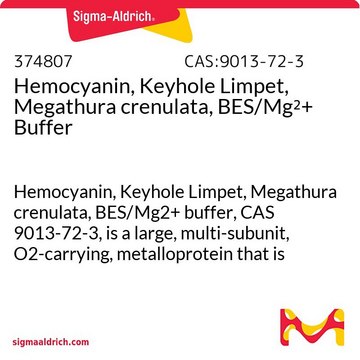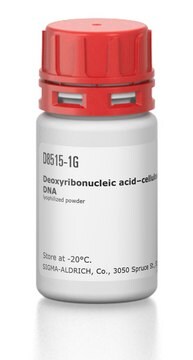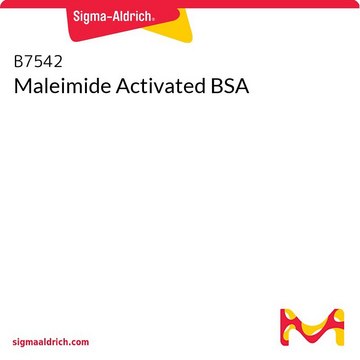H8283
Hemocyanin from Megathura crenulata (keyhole limpet)
PBS solution
Sinónimos:
KLH, Keyhole limpet hemocyanin
Iniciar sesiónpara Ver la Fijación de precios por contrato y de la organización
About This Item
Productos recomendados
origen biológico
Megathura crenulata
Nivel de calidad
Formulario
PBS solution
concentración
3.0-7.0 mg/mL protein (A280)
contenido de cobre
0.10-0.30% (based on protein)
técnicas
ELISA: suitable
temp. de almacenamiento
2-8°C
¿Está buscando productos similares? Visita Guía de comparación de productos
Descripción general
Gastropod hemocyanins are massive glycoproteins (4 to 8 MDa) designed by an intricate arrangement of 10 subunits that are self-assembled into hollow cylinders 35 nm in diameter.
Hemocyanin is a high molecular weight copper containing glycoprotein. It reversibly binds oxygen and forms the extra-cellular respiratory protein of mollusks. Keyhole limpet hemocyanin (KLH) is filtered from the hemolymph of Megathura crenulata, also called the giant keyhole limpet. It is native to the southern California coast and Mexico.
Aplicación
Keyhole limpet hemocyanin (KLH) is a strong and well known immune-stimulant in both experimental animals and humans. It has been used as a hapten carrier protein to enhance antigen-specific T cell priming and is known to stimulate a CD4+ T-cell response.
Hemocyanin was used to study if antipeptide antibodies specifically recognize the l1 protein of the human papilloma virus of type 31. It was also used to study the acid-induced unfolding of didecameric keyhole limpet hemocyanin.
Hemocyanin was used to study if antipeptide antibodies specifically recognize the l1 protein of the human papilloma virus of type 31. It was also used to study the acid-induced unfolding of didecameric keyhole limpet hemocyanin.
Forma física
Solution in PBS, pH 7.2, containing 1mM CaCl2 and 0.5 mM MgCl2 with 15 mM sodium azide as preservative
Nota de preparación
Chromatographically purified.
Código de clase de almacenamiento
10 - Combustible liquids
Clase de riesgo para el agua (WGK)
WGK 3
Punto de inflamabilidad (°F)
Not applicable
Punto de inflamabilidad (°C)
Not applicable
Elija entre una de las versiones más recientes:
¿Ya tiene este producto?
Encuentre la documentación para los productos que ha comprado recientemente en la Biblioteca de documentos.
Los clientes también vieron
Ankita Varshney et al.
Amino acids, 39(3), 899-910 (2010-03-10)
Keyhole limpet hemocyanin (KLH) is widely used as an immune stimulant and hapten carrier derived from a marine mollusc Megathura crenulata. To provide details of the stability and equilibrium of KLH, different intermediate species were investigated with a series of
Hendrikus J Wijnen et al.
Frontiers in veterinary science, 8, 784869-784869 (2022-01-01)
Resilient animals can cope with environmental disturbances in life with minimal loss of function. Resilience can be enhanced by optimizing early-life conditions. In poultry, eggshell temperature (EST) during incubation and early feeding are two early-life conditions that are found to
S M Andreev et al.
Bioorganicheskaia khimiia, 38(6), 667-675 (2013-04-04)
Antibodies that specifically recognize the capsid protein (L1) of human papillomavirus (HPV) are an important tool necessary for designing vaccines against HPV infection. In this work, we have predicted and synthesized peptide fragments mimicking B cell epitopes of L1 HPV
L R Ferguson et al.
Mutation research, 158(1-2), 89-95 (1985-10-01)
The tannins, delphinidin and procyanidin were isolated from flowers of white clover (Trifolium repens) and the leaves of Arnot Bristly Locust (Robina fertilis) respectively, and tested for mutagenic properties in a range of systems. There was no evidence for either
Traumatic aneurysm of the internal carotid artery with fracture dislocation at C 5: case report.
H Wada et al.
Neurosurgical review, 12 Suppl 1, 600-601 (1989-01-01)
Nuestro equipo de científicos tiene experiencia en todas las áreas de investigación: Ciencias de la vida, Ciencia de los materiales, Síntesis química, Cromatografía, Analítica y muchas otras.
Póngase en contacto con el Servicio técnico







